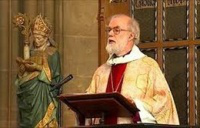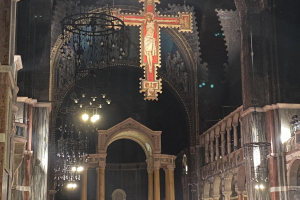Archbishop of Canterbury's Easter Sermon 2012

The Archbishop of Canterbury, Dr Rowan Williams says that the ultimate test of the Christian religion is not whether it is useful, beneficial or helpful to the human race but whether or not its central claim - the resurrection of Jesus Christ - actually happened.
Delivering his Easter morning sermon at Canterbury Cathedral, Dr Williams said that no other understanding of Easter morning made any sense:
"Easter makes a claim not just about a potentially illuminating set of human activities but about an event in history and its relation to the action of God. Very simply, in the words of this morning's reading from the Acts of the Apostles, we are told that 'God raised Jesus to life.' "
Any understanding of the significance of the resurrection which fell short of this truth would be to misunderstand it:
"We are not told that Jesus 'survived death'; we are not told that the story of the empty tomb is a beautiful imaginative creation that offers inspiration to all sorts of people; we are not told that the message of Jesus lives on. We are told that God did something - that is, that this bit of the human record, the things that Peter and John and Mary Magdalene witnessed on Easter morning, is a moment when ... we see through to the ultimate energy behind and within all things. When the universe began, prompted by the will and act of God and maintained in being at every moment by the same will and action, God made it to be a universe in which on a particular Sunday morning in AD33 this will and action would come through the fabric of things and open up an unprecedented possibility - for Jesus and for all of us with him: the possibility of a human life together in which the pouring out of God's Holy Spirit makes possible a degree of reconciled love between us that could not have been imagined ... for the Christian, the basic fact is that this compelling vision is there only because God raised Jesus"
Hostility towards faith and religion in public life might recently have become tempered with an appreciation of the part that religion plays in shaping and sustaining human existence, he says, and this is to be welcomed:
"there is plenty to suggest that younger people, while still statistically deeply unlikely to be churchgoers, don't have the hostility to faith that one might expect, but at least share some ... sense that there is
something here to take seriously - when they have a chance to learn about it. It is about the worst possible moment to downgrade the status and professional excellence of religious education in secondary schools - but that's another sermon…"
Even so, this was not the measure of its real significance:
"Easter raises an extra question, uncomfortable and unavoidable: perhaps 'religion' is more useful than the passing generation of gurus' thought; but is it true?"
The answer was found, not in instant scientific analysis but in a longer measure of the effect of belief in the lives of believers:
"How do we know that it is true? Not by some final knock-down would-be scientific proof, but by the way it works in us through the long story of a whole life and the longer story of the life of the community that believes it. We learn and assimilate its truth by the risk of living it; to those on the edge of it, looking respectfully and wistfully at what it might offer, we can only say, 'you'll learn nothing more by looking; at some point you have to decide whether you want to try to live with it and in it.'"
This he said, led Christians to search for deeper answers in response; exploring far more dangerous intellectual and physical territory in the search for the love of God at work, especially where easy answers are in short supply:
"A visit to Yad Vashem, the Holocaust Museum in Jerusalem, will convince you why the state of Israel exists and must go on existing. A visit to any border checkpoint will convince you that the daily harassment and
humiliation of Palestinians of all ages and backgrounds cannot be a justifiable or even sustainable price to pay for security. Listening to a rabbi talking about what it is like to witness the gathering up of body parts after a terrorist attack is something that can't be forgotten; neither is listening to a Palestinian whose parent or child has been killed in front of their eyes in a mortar bombing."
That commitment would involve hard conversations:
"If we believe in a God who acts, we have to go beyond this. We have to put immense energy into supporting those on the ground who show that they believe in a God who acts - those who continue, through networks like One Voice and the Bereaved Families Forum, to bring together people from both sides and challenge them to discover empathy and mutual commitment .... We have to prod and nag and encourage the religious leadership in the Holy Land on all sides to speak as if they believed in a God who acts, not only a God who endorses their version of reality. We have to pray, to pray for wisdom and strength and endurance for all who are hungry for peace and justice, pray that people will go on looking for a truly shared future. And we Christians in particular have to look for ways of practically supporting our brothers and sisters there through agencies like the Friends of the Holy Land or the Jerusalem and Middle East Church
Association - to help them stay in a context where they feel more and more unwelcome, yet where so many of them remain because they want to play a full part in creating this unimaginable shared future - because they believe in a God who acts."
But even when the contribution faith can make is acknowledged within the secular context, that shouldn't distract from the reality that it is the truth of the resurrection that counts, not its effect:
"When all's said and done about the newly acknowledged social value of religion, we mustn't forget that what we ultimately have to speak about isn't this but God: the God who raised Jesus and, as St Paul repeatedly says, will raise us also with him. Even if every commentator in the country expressed generous appreciation of the Church (and we probably needn't hold our breath…), we'd still be bound to say, 'Thank you - but what matters isn't our usefulness or niceness or whatever: it's God, purposive and active, even - especially - when we are at the end of our resources."
To read the full text go to: www.archbishopofcanterbury.org/articles.php/2440/archbishops-easter-sermon-2012-god-raised-jesus-to-life


















